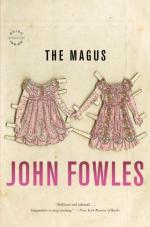|
This section contains 155 words (approx. 1 page at 400 words per page) |

|
Fowles's acknowledged literary precedent in the Celtic or medieval romance is apparent in The Magus with its notion of the questing hero in search of the meaning of life and the need for love. Fowles specifically acknowledges several other literary influences in his foreword to the revised version of The Magus. These include The Wanderer (1913), by Alain-Fournier for showing a secret hidden world to be explored and Jefferies's Bevis (1882) for projecting a very different world.
Another influence was Charles Dickens's Great Expectations (1861), to which Fowles plays homage by specifically referring to Miss Havisham in the revised version. Still another important influence was T. S. Eliot whom Fowles sees as a great "phrasemaker." Nicholas is called to the quest by some lines from Eliot's poem Four Quartets (1943).
Other allusions are to Odysseus, Theseus, and numerous other Greek mythical heroes, all of which strengthen the connection between previous...
|
This section contains 155 words (approx. 1 page at 400 words per page) |

|




